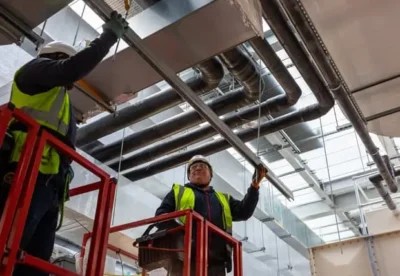Defence Secretary Dr Liam Fox today announced that a new body called the Defence Infrastructure Organisation will replace it in a bid to save billions.
The organisation will bring together all those working on estate and infrastructure activity across the Ministry of Defence.
But contractors are worried that changes could lead to more delays in work being awarded.
CECA director of external affairs Alasdair Reisner said: “We are concerned that any change may led to a logjam as the transition holds up procurement and delivery of vital upgrades and maintenance to the defence estate. It is essential that this is not allowed to happen.
“Given the significant backlog of work that must be delivered to ensure that the UK’s forces have the facilities that they require for training and operational purposes, we also feel that it is important that any savings made are reinvested in further works to the estate, ensuring that it is fit for purpose in the 21st century.”
Dr Fox said: “Our Armed Forces and their families deserve the best possible facilities in which to live, work, and prepare for operations, within the current financial situation.
“A single infrastructure organisation will provide effective support to our military personnel and better strategic management of the Defence Estate.
“It should also deliver significant savings in running costs, increase opportunities for estate rationalisation, and promote private sector growth – ultimately delivering better value for money to the taxpayer while giving the Armed Forces what they need.”
The new organisation will be a ‘one-stop shop’, managing the majority of infrastructure services across Defence.
The DIO will take on the estate management responsibilities of its predecessor, Defence Estates, overseeing the physical maintenance of buildings and equipment, including support services such as cleaning and catering, as well as energy and water for the estate.
It will also take on the management of infrastructure Private Finance Initiative contracts.
From 1 April 2011, the DIO will bring together roughly 7,000 staff, the vast majority of whom are civilian, working on construction, maintenance and disposal of land and buildings across the Department.
Most staff currently work for Defence Estates, the rest work in infrastructure within the three Services and other smaller organisations.
The Ministry of Defence expects there to be a reduction of about 2,500 posts by 2014, and to save £1.2bn over the first four years through estate rationalisation and other efficiency measures.
Defence Estate’s Chief Executive, Andrew Manley, who is leading the team responsible for the programme to create the new organisation, said: “This new organisation is being designed to ensure we have an affordable and sustainable military estate that gives our Armed Forces the best possible facilities in which to live, work and train.
“A single infrastructure organisation will provide better strategic management of the Defence Estate whilst also delivering significant savings in running costs and offering increased opportunities for estate rationalisation.”
The DIO will take on the responsibilities of Defence Estates, which currently spends £2bn each year, managing around 240,000 hectares of land and property on behalf of the MoD.
The current military estate comprises three main areas: the Built Estate, which is made up of barracks, naval bases, depots and airfields; the Housing Estate, which requires management of over 48,000 Service families homes; and the Defence Training Estate, which comprises 16 major Armed Forces training areas and 104 other training areas and ranges in the UK alone.
Defence infrastructure staff are already working on rationalising ‘soft’ facilities management contracts, for support services such as cleaning and catering.
This is a first step towards the DIO taking responsibility for ‘Total FM’. Ultimately, single regional contracts will cover ‘soft’ and ‘hard’ FM, such as the physical maintenance of buildings and equipment, as well as providing energy and water to the estate.
















































 (300 x 250 px) (2).png)






